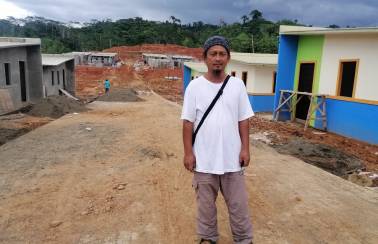Holcim Philippines leans on sustainability, innovation to help address country’s housing gap
With its intent to lead the building materials industry in sustainability and innovation, Holcim Philippines has committed to strengthen its environmental performance and raise social impact as it grows the business.
Helping address the estimated 6.5 million housing deficit in the Philippines is among the key areas where the company looks to make a positive difference through innovation. The company is developing new products that deliver same or superior performance while utilizing less natural resources by reusing wastes as alternative fuels and raw materials. The company has expanded its portfolio with sustainable products to help builders use materials efficiently and lower project’s impact to the environment.
“Using the right products for the right applications goes a long way in building better structures more efficiently. Our expanding portfolio of products can help ensure that homes are built affordably, with the right materials while delivering superior quality,” said Holcim Philippines President and CEO Horia Adrian.
This year, Holcim Philippines has already launched three new products in line with this thrust—ready-to-use mortar Holcim Multifix, water-repellent cement Holcim Aqua X, and Holcim Autoclaved Aerated Concrete Block Adhesive. The company is holding technical briefings with industry partners to demonstrate the performance of these new materials in improving construction efficiency and quality while lowering environmental footprint.
In addition to providing sustainable building materials and solutions, Holcim Philippines is ramping up direct engagements with shelter organizations to better understand the challenges in building affordable homes and inform future initiatives for a bigger impact. This year, it partnered with Habitat for Humanity Philippines to build 500 houses in Valenzuela City and Negros Occidental. It is also working with the United Nations Human Settlements Program (UN-Habitat) to put up 900 shelters in the City of Marawi for families affected by the conflict there.
“These engagements have opened our eyes on the opportunities to make a difference and convey to stakeholders in the affordable housing community our commitment to help. As we learn more, we look to develop new solutions or introduce ones developed by experts from the Holcim Group,” Adrian said.
Among the most promising ones is a 3D concrete printing technology which the Holcim Group developed and used in Africa in June to build a school’s walls in just 18 hours instead of days with conventional materials and practices. Also in Africa, the Holcim Group industrialized and scaled up the production of soil-stabilized and weather resistant bricks called Durabric with factories that can be either fixed or mobile.
The focus on affordable housing is part of the Holcim Group’s 2030 people strategy to continue creating shared value and uplifting the wellbeing of communities worldwide. The strategy focuses on three pillars: bridging the world’s housing and infrastructure gap, improving livelihoods and upholding the highest standards of human rights. Holcim’s commitment builds on its legacy of positive social impact, having benefited over 31 million people with more than CHF 200m in social investment over the last five years.
Holcim Philippines is further responding to the building industry’s need to up-skill the labor force particularly masons to help them adapt to advances in building materials and technologies. Through its flagship corporate social responsibility program ‘galing Mason, the company has helped train and accredited as skilled workers over 5,000 masons nationwide. Aside from making them better skilled in using new materials for building better quality and affordable houses, Galing Mason also expands livelihood opportunities for graduates and improves their ability to afford their own homes.
Janodin Lao, a participant in the ‘galing Mason program of Holcim Philippines in Marawi, is one of these success stories. Lao lost his airline ticketing office and cellphone store to the conflict, but was able to stand back up after participating in the masonry trainings.
Equipped with skills from ‘galing Mason and his own entrepreneurial drive, Lao formed a group of masons that took on building assignments in the UN-Habitat’s rehabilitation project in Marawi.
“Malaki ang naitulong nito sa pinansyal na pangangailangan ng pamilya ko. Mas may nagagamit na ako para sa pag-aaral ng mga anak ko, may napagkukuhanan na sa mga bayarin sa pangangailangan sa bahay, at iba pa (The training has greatly helped in meeting my family’s financial needs. I can now spend for my children’s education and household needs),” Lao said.
With its edge in innovation, growing understanding of building affordable houses through institutional partnerships, and programs to help advance the skills and knowhow of local builders, Holcim Philippines is optimistic that it can make a positive difference.
“The government released in May the National Housing and Urban Development Sector Plan (NHUDSP), a 20-year multi-sectoral road map that puts together the inputs from important stakeholders in the housing industry for a unified approach towards fulfilling the mission of providing every Filipino the decent home they deserve. Those align with our objectives in Holcim Philippines to help build a more inclusive progress in the country. We look forward to working with partners in making this ambition a reality,” Adrian said.
- Holcim pushes for faster blended cement adoption in Philippines
- Holcim Philippines, Build Change seal partnership for disaster-resilient construction
- Holcim helps strengthen La Union vs. COVID-19 with vaccine donation
- Holcim Philippines enhances masonry cement Holcim Wallright Prime for greater strength, versatile use
- Geocycle Philippines looks to strengthen contribution to sustainable waste management




